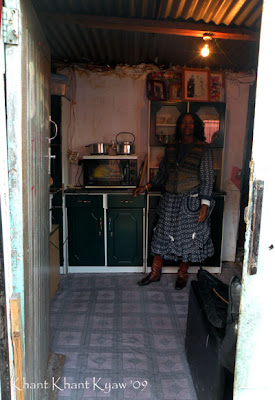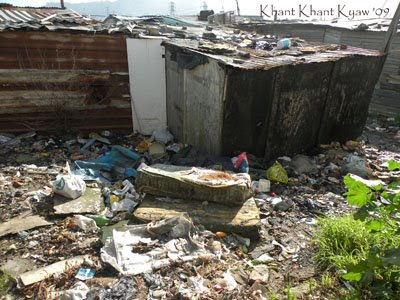For the past 5 weeks that I had been here, I was convinced that South Africa was a nation, well on its path of development. There seems to be countless numbers of NGOs here, doing work related to HIV/AIDS, child abuse, education, women empowerment... etc. And considering that I live in the downtown Cape Town, a place usually occupied by tourists and retirees, I had never really seen how South Africans in Cape Town actually lived.
Of course one cannot collapse the many racial diversities into one group of "South Africans," but I was shocked, when I visited this township, called Gugu Lethu, home for Xhosa people.

The entire residential area was filled with structures like the ones in this photograph. Their houses, or "shacks" as they are called, are built with the bare mininum materials- tin sheets. Each shack is built so close to another, that at some points, I had to walk sideways to get through the path.

Each shack is no bigger than 4 by 2 meters and has a bed which is also used as a sofa for guests, a dressing table, a small television) a stove and a fridge (if the residents could afford).
This is a photo of Lulekwa's mom. (Lulekwa is the lady I met on the way back from eastern cape and she lives in the shack across from her mom with her 17 year old son and a 13 year old daughter).

The people in the Townships basically share almost all ammenities. They use public toilets like the blue ones in this photo. As for electricity, one has to buy the wires to connect the electricity main to their shacks at the risk of being stolen along the way.

Even water is shared through a communal tap. The taps are spread out, one on each road. I was told that there are times when water supply gets cut off, and so the residents are left without any water to cook or clean. However, on rainy days, they get an unwated supply of water rushing into their homes, leaving their belongings flooded.

Needless to say, people in these townships live in dire poverty. And as a result, crimes like robbery, theft and rape are not uncommon.

I thought this was an interesting picture to potray how the family structures in South African black communities are. Children make up about 50% of the population in the township, and they are all living with their mothers, who are living with their ... boyfriends. A stable married family is often the exception, in places like the township. This could point out the link between, income and education on life decisions.

And most of these single moms fell pregnant before they finish their high school education. They often dont have enough money/nutrition information to raise their children on a proper diet.This picture above is one of a convenient store in the township. It has tomatoes and cabbages, and potato chips. These food items make up their diets.

To me, it is a puzzle to how the government of South Africa could pump in millions of dollars into construction of shopping malls, development of 2010 facilities and even the battle against AIDS. Granted that the fight against such infectious disease is not an easy victory, and it has to come with much effort on all fronts, espcieally in a country such as South Africa, where one in 4 adults are infected. But unless housing and sanitation conditions for the people here are improved, it is going to be a futile effort battle AIDS, or TB, or even provide children with the education and a healthy childhood they deserve.
I spoke about this with a friend and she has told me that it has been a difficult effort to relocate the blacks here, because they have had a difficult history of being forcefully relocated in the past. But I don't think that is a good enough reason to stop giving people the most basic ammenities each person deserves, especially in a city like cape town that has much disposable wealth!

 Malindi @ Sunrise.
Malindi @ Sunrise.























































